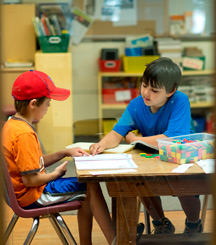Just before Arlene English’s daughter, Jaylene, started high school she got her first acne breakout. “Jaylene became obsessed with skincare products and make-up. She was so concerned with how ‘ugly’ she looked, she didn’t want to go to school,” says English.
Insecurity about appearance is common for tween and teen boys and girls. “Lots of kids have issues, from acne to their height to being too heavy or too skinny. This is a time when kids are figuring out who they are. Insecurity about their appearance can be a part of that discovery process,” says child psychologist Cassandra White.
Handling the Disclosure
Some parents offer blanket compliments that don’t resonate (such as “you’re so pretty”) or dismiss their child’s concerns, which doesn’t help. Guidance counselor Elise Proulx says that however insignificant the concern might seem, it’s important for tweens to know that they are supported.
A comment like “I’m so ugly” could communicate either a passing frustration (such as at a pimple) or an ongoing belief that the child will always feel ugly and doesn’t measure up to peers. “If its just a passing comment, it might be appropriate to discuss the feelings and not make a big deal out of it,” says White. “If it’s ongoing, the situation isn’t likely to be solved by simply acknowledging the feelings. There will probably need to be multiple conversations and discussions of a plan of action.”
What To Do
Ask your child how you can help. “You don’t have to have all the solutions,” says White, “It’s important for preteens to learn to problem-solve and make decisions to change and impact their lives.”
You might find that your preteen just wants to be heard and no action is required. If you decide to act, following through with the solutions you discuss, such as a visit with a dermatologist, is important.
“School staff can help in these situations,” says Proulx, “Many will make an extra effort to help that child to build self-esteem.” Getting tweens involved in activities can help them realize that the way they look is just one part of who they are. “Participating in volunteer activities is a good way for a child to feel valued, and help them realize that all people have different strengths,” says Proulx.
Lola Augustine is a freelance writer.





